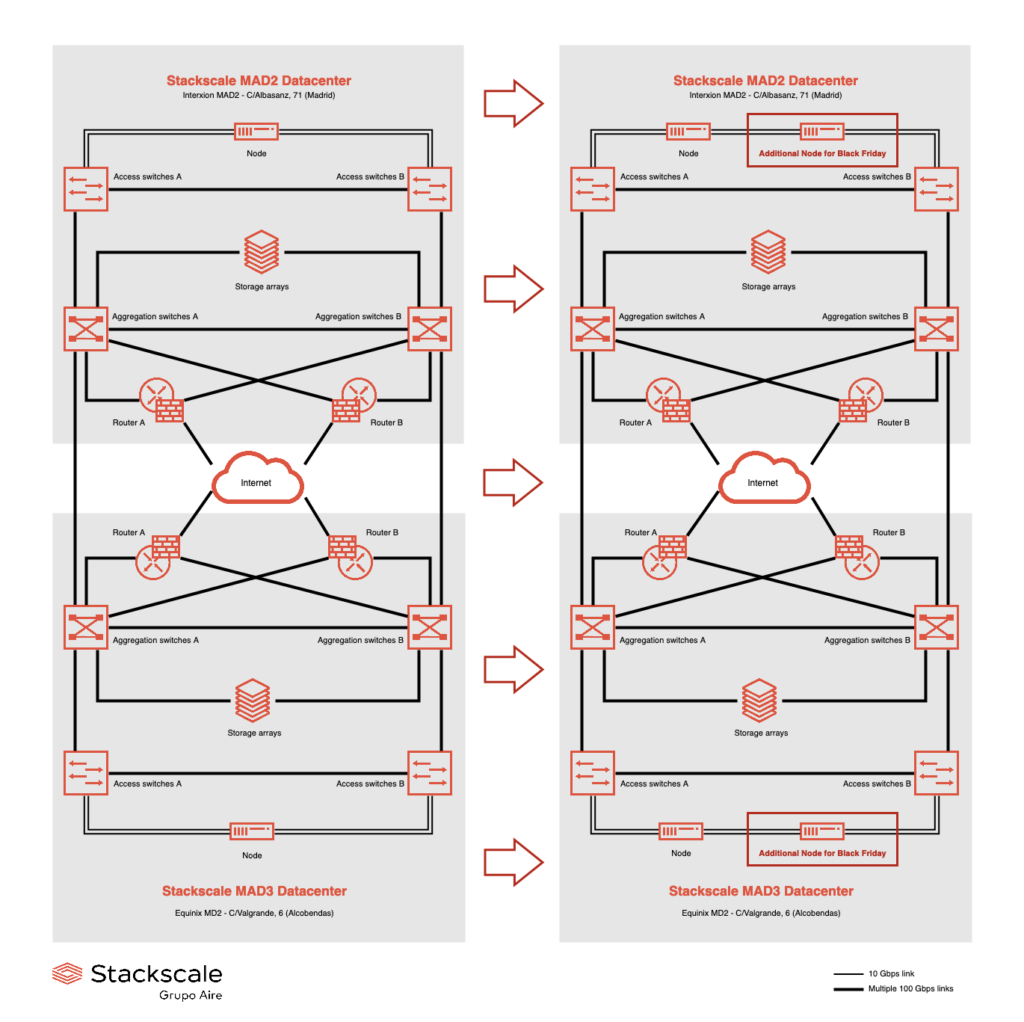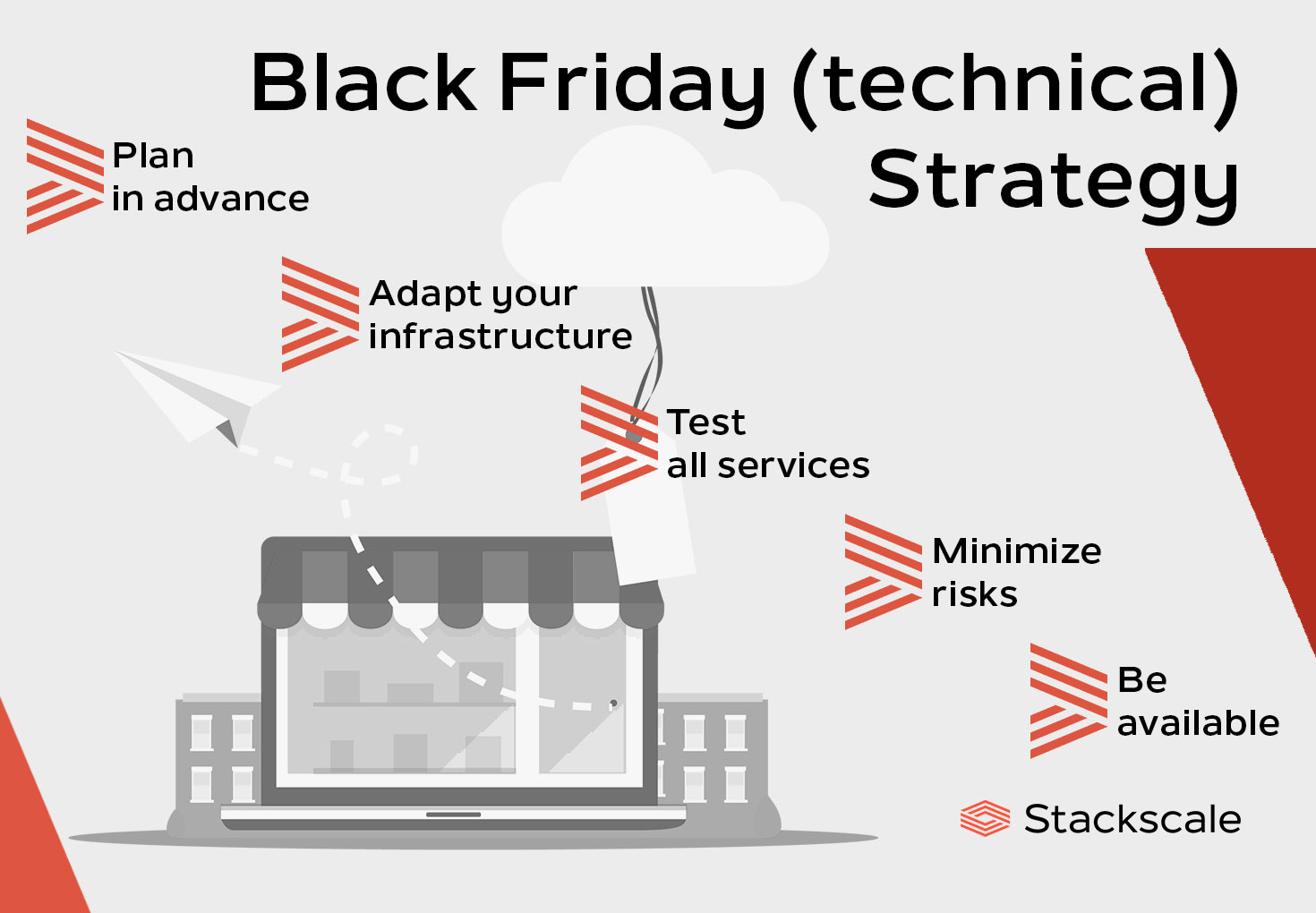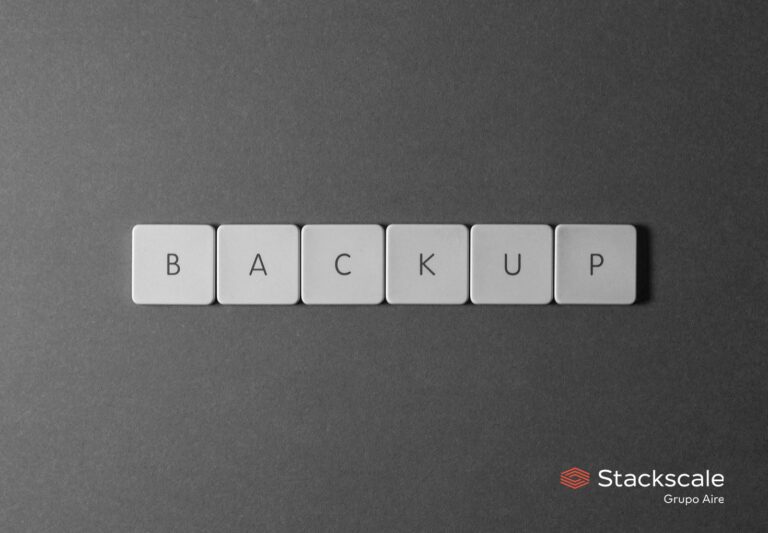Preparing your eCommerce Black Friday strategy? Keep in mind these 5 simple steps to ensure your eCommerce site can make the most of this campaign. With consumers getting more and more sophisticated and demanding, every second counts. Thus, high-availability, performance and security are more important than ever.
A great sales and marketing plan can bring you hundreds and thousands of consumers into your eCommerce site. But it will be useless if your infrastructure and systems are not able to handle such an increase in traffic. Downtime will send your potential customers away to another available online shop.
That is why, along with a compelling marketing and sales strategy, it is essential to technically prepare your eCommerce platform for Black Friday. The increase in traffic and interactions will put IT systems to the test and they must be up to it. So, let’s deep dive into the 5 keys to technically nail your Black Friday strategy!
Plan your Black Friday strategy in advance
Planning seems obvious but it is definitely necessary as well. As in any other strategic campaign, having a plan is key to be prepared for any scenario. Factoring technical requirements into your eCommerce Black Friday strategy from the beginning will help you identify the necessary adjustments to make it a success.
Besides, do not forget to enable collaboration among teams — from product and development to sales and marketing. All departments should be aligned about the campaign predictions and goals to make sure the technical infrastructure is ready to handle the expected increase in traffic. On this matter, relying on an expert system administration team can be truly helpful to smoothly address every aspect from high availability to cybersecurity, and so on.
When to start preparing your infrastructure for Black Friday?
Leaving the technical aspects of your Black Friday strategy to the last minute is not the best idea. It is advisable to start preparing your cloud infrastructure for Black Friday at least 3 or 4 weeks in advance — or even more depending on the project’s size and requirements.
Scale resources in advance
Adapting your infrastructure to traffic predictions will help you avoid loading problems, downtime and virtual queues when a lot of buyers come into your eCommerce site.
During Black Friday, businesses double and even triple their visits and transactions. That is why it is essential to scale up resources to handle spikes in traffic and interactions. To do so, it is necessary to take into account both traffic estimates and historical data from previous years (if available).
Moreover, it is advisable to scale resources during a few days or even weeks to ensure everything works correctly and avoid last minute problems.
Key aspect to avoid downtime during Black Friday
Needs vary significantly from one project to another. But there are some relevant aspects that virtually all businesses should evaluate:
- Storage and computing capacity.
- Available bandwidth.
- Service speed, along with the usage of a CDN to accelerate the loading speed of diverse elements such as images or videos. On this matter, it is also important to know where users are coming from in order to increase efficiency.
- Monitoring of the buying process and shopping cart to ensure everything works at all times.
- The ability of the chosen payment gateways to handle spikes in traffic.
- Cybersecurity services such as Anti-DDoS or WAF.
- 24/7 infrastructure and IT systems monitoring.
Adapt your infrastructure to the expected demand
Let’s delve into how to adapt a cloud infrastructure to anticipate demand during campaigns with a great volume of visits and sales, such as Black Friday or Cyber Monday. To do so, we will take as an example an eCommerce with the following High-Availability cloud infrastructure:
- 2 compute nodes, distributed in 2 data centers to increase resilience and availability in case of an incident in one of them.
- Network storage, available on a pay per use basis, in both data centers with cross-site backups and replicas.
- Unlimited bandwidth. The customer contracts a particular bandwidth and excess is billed using the 95th percentile method.
This eCommerce expects to double its traffic during the Christmas and Black Friday campaigns, based on analyzed data (historical, estimates and real daily loads). In order to be able to handle this growth in demand, it could reinforce its infrastructure by adding an additional node in each data center. This would enable it to double or more than double overall capacity.

Regarding storage and bandwidth:
- Network storage remains unchanged as it is available on a pay per use basis.
- The bandwidth contracted by the customers can also remain the same as excess is billed using the 95th Percentile method.
In addition to all that, there are other elements to consider such as: centralization and logs analysis servers, development deployments, monitoring, additional backups, etc. Which become particularly critical during these periods with a large number of customers. That is why, durings type of campaigns, it is indispensable to reinforce aspects such as monitoring and the proper functioning of buying processes and payment methods in the online shop.
Furthermore, regarding software, the example of HA infrastructure mentioned above would require:
- At least 2 load balancers.
- At least 2 queues and/or cache servers.
- At least 2 web servers.
- At least 2 PHP-FPM servers (in case of using Magento, WooCommerce or Prestashop) or other language managed by the platform.
- A MySQL DB cluster (with at least 3 instances).
According to the campaign’s needs and forecasts, the customer could also scale some of these software elements.
Test, test and test
Do not overlook the importance of testing!
Test every part of your eCommerce site to ensure all sections can handle the forecasted volume of users during Black Friday. Measuring your site’s stability, scalability, throughput and performance is always relevant, but especially during strategic campaigns.
Test that all services are running properly, that the site can handle both expected and high load conditions, etc. Load tests, for instance, can help you determine normal performance metrics and response times; as well as bottlenecks or issues that might be causing a degradation of the Quality of Service.
Moreover, it is a great opportunity to check contingency plans are up to date and tested. Let’s not forget that it is important to test them at least once a year. Just like we must always keep cybersecurity in mind. Assessing and reinforcing security measures is vital to prevent cyberattacks from disrupting your business during such a critical period.
Minimize risks
Implementing improvements and new developments can sound appealing to increase sales and engagement. However, it can also lead to unexpected issues that could end up ruining all your efforts. Therefore, as Black Friday gets closer, it is better to leave non-critical developments and upgrades on standby. Since last minute changes could have a negative impact on revenues.
Moreover, in order to minimize risks, relying on a high-availability solution is the way to go. An HA infrastructure ensures maximum performance and minimal downtime, thus increasing customer satisfaction, returning customer rate and, consequently, revenue. Even more when implementing geo-replicated HA in two active-active data centers.
Be available
Last but not least, make sure your team is available to proactively act in case unexpected issues come up during critical hours. The same way you rely on a cloud provider that is always available.
An infrastructure and IT systems team that is available 24/7 is always key, but especially during these heavy-sales periods.
To sum up, businesses must carefully assess their technical infrastructure to make sure they provide the best customer experience possible. To do so, many organizations rely on specialized eCommerce cloud partners.
If you would like to benefit from a cloud solution designed to provide high-availability, maximum performance and minimum latency, we can help your business boost performance with our high-availability cloud solutions.





